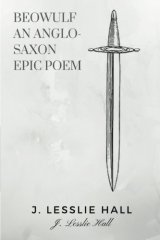Beowulf Page #5
Beowulf is an Old English epic poem consisting of 3,182 alliterative lines. It is one of the most important works of Old English literature. The date of composition is a matter of contention among scholars; the only certain dating pertains to the manuscript, which was produced between 975 and 1025.
{He leaves Daneland on the breast of a bark.} Who when first he was born outward did send him Lone on the main, the merest of infants: And a gold-fashioned standard they stretched under heaven [3] 50 High o'er his head, let the holm-currents bear him, Seaward consigned him: sad was their spirit, Their mood very mournful. Men are not able {No one knows whither the boat drifted.} Soothly to tell us, they in halls who reside,[4] Heroes under heaven, to what haven he hied. [1] For the 'Þæt' of verse 15, Sievers suggests 'Þá' (= which). If this be accepted, the sentence 'He had ... afflicted' will read: He (i.e. God) had perceived the malice-caused sorrow which they, lordless, had formerly long endured. [2] For 'aldor-léase' (15) Gr. suggested 'aldor-ceare': He perceived their distress, that they formerly had suffered life-sorrow a long while. [3] A very difficult passage. 'Áhte' (31) has no object. H. supplies 'geweald' from the context; and our translation is based upon this assumption, though it is far from satisfactory. Kl. suggests 'lændagas' for 'lange': And the beloved land-prince enjoyed (had) his transitory days (i.e. lived). B. suggests a dislocation; but this is a dangerous doctrine, pushed rather far by that eminent scholar. [4] The reading of the H.-So. text has been quite closely followed; but some eminent scholars read 'séle-rædenne' for 'sele-rædende.' If that be adopted, the passage will read: Men cannot tell us, indeed, the order of Fate, etc. 'Sele-rædende' has two things to support it: (1) v. 1347; (2) it affords a parallel to 'men' in v. 50. II. SCYLD'S SUCCESSORS.--HROTHGAR'S GREAT MEAD-HALL. {Beowulf succeeds his father Scyld} In the boroughs then Beowulf, bairn of the Scyldings, Belovèd land-prince, for long-lasting season Was famed mid the folk (his father departed, The prince from his dwelling), till afterward sprang 5 Great-minded Healfdene; the Danes in his lifetime He graciously governed, grim-mooded, agèd. {Healfdene's birth.} Four bairns of his body born in succession Woke in the world, war-troopers' leader Heorogar, Hrothgar, and Halga the good; 10 Heard I that Elan was Ongentheow's consort, {He has three sons--one of them, Hrothgar--and a daughter named Elan. Hrothgar becomes a mighty king.} The well-beloved bedmate of the War-Scylfing leader. Then glory in battle to Hrothgar was given, Waxing of war-fame, that willingly kinsmen Obeyed his bidding, till the boys grew to manhood, 15 A numerous band. It burned in his spirit To urge his folk to found a great building, A mead-hall grander than men of the era {He is eager to build a great hall in which he may feast his retainers} Ever had heard of, and in it to share With young and old all of the blessings 20 The Lord had allowed him, save life and retainers. Then the work I find afar was assigned [4] To many races in middle-earth's regions, To adorn the great folk-hall. In due time it happened Early 'mong men, that 'twas finished entirely, 25 The greatest of hall-buildings; Heorot he named it {The hall is completed, and is called Heort, or Heorot.} Who wide-reaching word-sway wielded 'mong earlmen. His promise he brake not, rings he lavished, Treasure at banquet. Towered the hall up High and horn-crested, huge between antlers: 30 It battle-waves bided, the blasting fire-demon; Ere long then from hottest hatred must sword-wrath Arise for a woman's husband and father. Then the mighty war-spirit[1] endured for a season, {The Monster Grendel is madly envious of the Danemen's joy.} Bore it bitterly, he who bided in darkness, 35 That light-hearted laughter loud in the building Greeted him daily; there was dulcet harp-music, Clear song of the singer. He said that was able {[The course of the story is interrupted by a short reference to some old account of the creation.]} To tell from of old earthmen's beginnings, That Father Almighty earth had created, 40 The winsome wold that the water encircleth, Set exultingly the sun's and the moon's beams To lavish their lustre on land-folk and races, And earth He embellished in all her regions With limbs and leaves; life He bestowed too 45 On all the kindreds that live under heaven. {The glee of the warriors is overcast by a horrible dread.} So blessed with abundance, brimming with joyance, The warriors abided, till a certain one gan to Dog them with deeds of direfullest malice, A foe in the hall-building: this horrible stranger[2] 50 Was Grendel entitled, the march-stepper famous Who[3] dwelt in the moor-fens, the marsh and the fastness; The wan-mooded being abode for a season [5] In the land of the giants, when the Lord and Creator Had banned him and branded. For that bitter murder, 55 The killing of Abel, all-ruling Father {Cain is referred to as a progenitor of Grendel, and of monsters in general.} The kindred of Cain crushed with His vengeance; In the feud He rejoiced not, but far away drove him From kindred and kind, that crime to atone for, Meter of Justice. Thence ill-favored creatures, 60 Elves and giants, monsters of ocean, Came into being, and the giants that longtime Grappled with God; He gave them requital. [1] R. and t. B. prefer 'ellor-gæst' to 'ellen-gæst' (86): Then the stranger from afar endured, etc. [2] Some authorities would translate 'demon' instead of 'stranger.' [3] Some authorities arrange differently, and render: Who dwelt in the moor-fens, the marsh and the fastness, the land of the giant-race. III. GRENDEL THE MURDERER. {Grendel attacks the sleeping heroes} When the sun was sunken, he set out to visit The lofty hall-building, how the Ring-Danes had used it For beds and benches when the banquet was over. Then he found there reposing many a noble 5 Asleep after supper; sorrow the heroes,[1] Misery knew not. The monster of evil Greedy and cruel tarried but little, {He drags off thirty of them, and devours them} Fell and frantic, and forced from their slumbers Thirty of thanemen; thence he departed 10 Leaping and laughing, his lair to return to, With surfeit of slaughter sallying homeward. In the dusk of the dawning, as the day was just breaking, Was Grendel's prowess revealed to the warriors: {A cry of agony goes up, when Grendel's horrible deed is fully realized.} Then, his meal-taking finished, a moan was uplifted, 15 Morning-cry mighty. The man-ruler famous, The long-worthy atheling, sat very woful, Suffered great sorrow, sighed for his liegemen, [6] When they had seen the track of the hateful pursuer, The spirit accursèd: too crushing that sorrow,
Translation
Translate and read this book in other languages:
Select another language:
- - Select -
- 简体中文 (Chinese - Simplified)
- 繁體中文 (Chinese - Traditional)
- Español (Spanish)
- Esperanto (Esperanto)
- 日本語 (Japanese)
- Português (Portuguese)
- Deutsch (German)
- العربية (Arabic)
- Français (French)
- Русский (Russian)
- ಕನ್ನಡ (Kannada)
- 한국어 (Korean)
- עברית (Hebrew)
- Gaeilge (Irish)
- Українська (Ukrainian)
- اردو (Urdu)
- Magyar (Hungarian)
- मानक हिन्दी (Hindi)
- Indonesia (Indonesian)
- Italiano (Italian)
- தமிழ் (Tamil)
- Türkçe (Turkish)
- తెలుగు (Telugu)
- ภาษาไทย (Thai)
- Tiếng Việt (Vietnamese)
- Čeština (Czech)
- Polski (Polish)
- Bahasa Indonesia (Indonesian)
- Românește (Romanian)
- Nederlands (Dutch)
- Ελληνικά (Greek)
- Latinum (Latin)
- Svenska (Swedish)
- Dansk (Danish)
- Suomi (Finnish)
- فارسی (Persian)
- ייִדיש (Yiddish)
- հայերեն (Armenian)
- Norsk (Norwegian)
- English (English)
Citation
Use the citation below to add this book to your bibliography:
Style:MLAChicagoAPA
"Beowulf Books." Literature.com. STANDS4 LLC, 2025. Web. 8 Mar. 2025. <https://www.literature.com/book/beowulf_945>.








Discuss this Beowulf book with the community:
Report Comment
We're doing our best to make sure our content is useful, accurate and safe.
If by any chance you spot an inappropriate comment while navigating through our website please use this form to let us know, and we'll take care of it shortly.
Attachment
You need to be logged in to favorite.
Log In